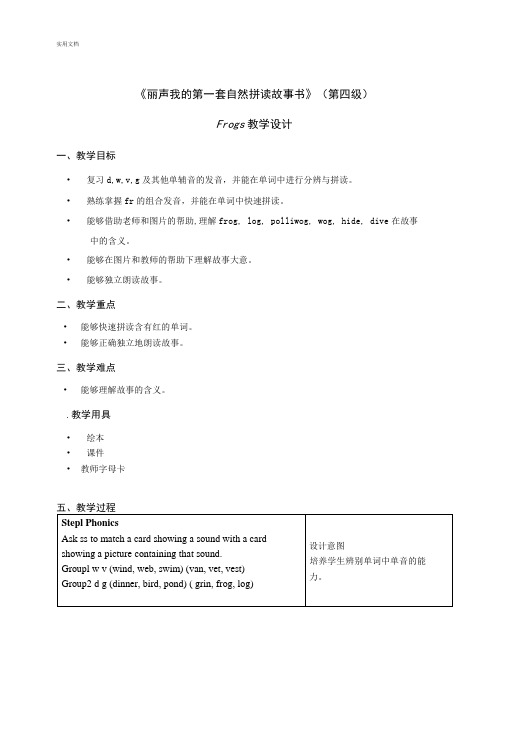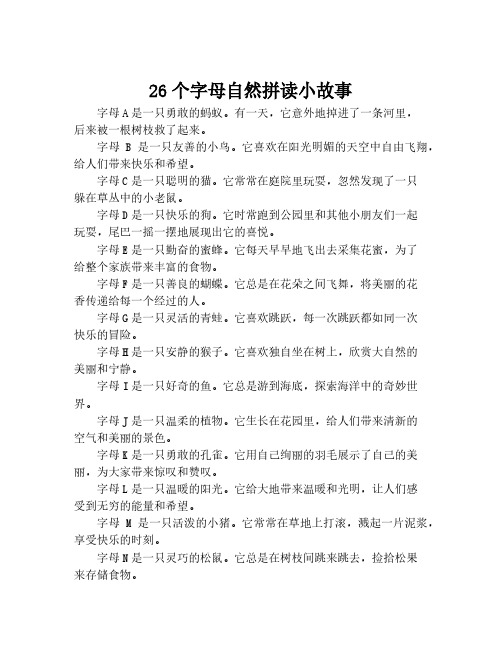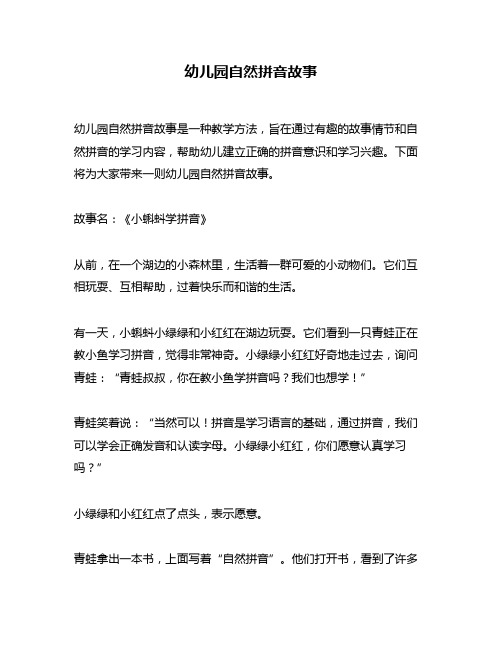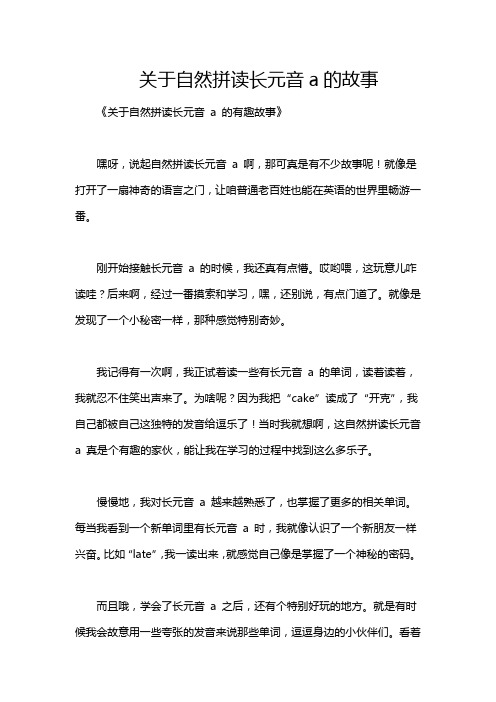自然拼读故事
26个字母自然拼读小故事

26个字母自然拼读小故事(原创实用版2篇)目录(篇1)一、前言:介绍 26 个字母的自然拼读小故事二、A 到 Z 的 26 个字母及其代表动物1.A:狮子(Lion)2.B:蝴蝶(Butterfly)3.C:猫头鹰(Owl)4.D:大象(Elephant)5.E:鹰(Eagle)6.F:狐狸(Fox)7.G:狗(Dog)8.H:海豚(Dolphin)9.I:冰激凌(Ice Cream)10.J:长颈鹿(Giraffe)11.K:风筝(Kite)12.L:狮子(Lion)13.M:猴子(Monkey)14.N:鹦鹉(Parrot)15.O:企鹅(Penguin)16.P:熊猫(Panda)17.Q:企鹅(Quail)18.R:老鼠(Rat)19.S:蛇(Snake)20.T:老虎(Tiger)21.U:伞(Umbrella)22.V:兔子(Vole)23.W:乌龟(Tortoise)24.X:小熊(X-ray)25.Y:鸭子(Yellow)26.Z:斑马(Zebra)三、结论:总结 26 个字母的自然拼读小故事正文(篇1)一、前言在英语学习的过程中,自然拼读法是一种非常有效的方法。
为了帮助孩子们更好地掌握这一方法,我们创作了 26 个字母的自然拼读小故事。
这些故事将每个字母与一个动物或物品联系起来,以激发孩子们的学习兴趣。
下面我们就来一起看看这 26 个小故事吧。
二、A 到 Z 的 26 个字母及其代表动物1.A:狮子(Lion)A 字母的代表动物是狮子,它可以让孩子们联想到狮子的勇敢和力量。
2.B:蝴蝶(Butterfly)B 字母的代表动物是蝴蝶,它可以让孩子们联想到蝴蝶的美丽和自由。
3.C:猫头鹰(Owl)C 字母的代表动物是猫头鹰,它可以让孩子们联想到猫头鹰的智慧和神秘。
4.D:大象(Elephant)D 字母的代表动物是大象,它可以让孩子们联想到大象的强壮和友善。
5.E:鹰(Eagle)E 字母的代表动物是鹰,它可以让孩子们联想到鹰的勇敢和敏锐。
自然拼读故事

自然拼读故事故事一,小猫学拼读。
从前,有一只叫做小花的小猫,她非常喜欢学习拼读。
有一天,她在书架上发现了一本关于自然拼读的书,于是她决定好好学习一下。
小花打开书,看到了一些常见的自然拼读规律,比如“an”在单词中发音为“安”,“en”在单词中发音为“恩”等等。
小花非常认真地学习了这些规律,她发现原来学习拼读并不难,只要掌握了规律,就能够轻松地读懂单词。
从此以后,小花变得更加热爱学习,她的拼读水平也越来越高。
故事二,勇敢的小鸟。
在一片美丽的森林里,住着一群可爱的小鸟。
有一天,他们听说了一个关于自然拼读的传说,传说中有一种神奇的力量可以帮助他们更好地学习拼读。
于是,小鸟们决定踏上寻找自然拼读之力的旅程。
经过千辛万苦,他们终于来到了传说中的地方,那里有一位智慧的老师教给他们自然拼读的奥秘。
小鸟们学会了“ai”发音为“艾”、“ou”发音为“欧”等规律,他们兴奋地回到森林,将这些知识传授给其他小鸟。
从此以后,森林里的小鸟们都变得非常勇敢,因为他们知道掌握了自然拼读规律,就能够更好地表达自己。
故事三,勤奋的小蚂蚁。
在一个美丽的花园里,住着一群勤奋的小蚂蚁。
它们每天都在花园里辛勤地工作,为了更好地交流,它们也开始学习自然拼读。
小蚂蚁们发现,学习拼读并不是一件容易的事情,但是只要他们勤奋地学习,就一定能够取得进步。
于是,它们每天都花很多时间学习自然拼读规律,比如“ee”发音为“伊”、“oo”发音为“欧”等等。
经过不懈的努力,小蚂蚁们终于掌握了自然拼读的规律,它们可以更好地理解和表达自己了。
通过这些故事,我们可以看到,自然拼读是一种非常重要的语言学习方法。
只要我们认真学习,掌握了自然拼读的规律,就能够更好地理解和运用语言。
希望大家能够通过这些故事,更加热爱学习自然拼读,提高自己的语言能力。
让我们一起努力,成为自然拼读的高手!。
丽声我的第一套自然拼读故事书第四级A3-Frogs-教学设计

《丽声我的第一套自然拼读故事书》(第四级)
Frogs教学设计
一、教学目标
•复习d,w,v,g及其他单辅音的发音,并能在单词中进行分辨与拼读。
•熟练掌握fr的组合发音,并能在单词中快速拼读。
•能够借助老师和图片的帮助,理解frog, log, polliwog, wog, hide, dive在故事中的含义。
•能够在图片和教师的帮助下理解故事大意。
•能够独立朗读故事。
二、教学重点
•能够快速拼读含有红的单词。
•能够正确独立地朗读故事。
三、教学难点
•能够理解故事的含义。
.教学用具
•绘本
•课件
•教师字母卡
五、教学过程
实用文档
六、家庭作业
•熟读故事
•小组表演这个故事
•为本书涂色。
26个字母自然拼读小故事

26个字母自然拼读小故事字母A是一只勇敢的蚂蚁。
有一天,它意外地掉进了一条河里,后来被一根树枝救了起来。
字母B是一只友善的小鸟。
它喜欢在阳光明媚的天空中自由飞翔,给人们带来快乐和希望。
字母C是一只聪明的猫。
它常常在庭院里玩耍,忽然发现了一只躲在草丛中的小老鼠。
字母D是一只快乐的狗。
它时常跑到公园里和其他小朋友们一起玩耍,尾巴一摇一摆地展现出它的喜悦。
字母E是一只勤奋的蜜蜂。
它每天早早地飞出去采集花蜜,为了给整个家族带来丰富的食物。
字母F是一只善良的蝴蝶。
它总是在花朵之间飞舞,将美丽的花香传递给每一个经过的人。
字母G是一只灵活的青蛙。
它喜欢跳跃,每一次跳跃都如同一次快乐的冒险。
字母H是一只安静的猴子。
它喜欢独自坐在树上,欣赏大自然的美丽和宁静。
字母I是一只好奇的鱼。
它总是游到海底,探索海洋中的奇妙世界。
字母J是一只温柔的植物。
它生长在花园里,给人们带来清新的空气和美丽的景色。
字母K是一只勇敢的孔雀。
它用自己绚丽的羽毛展示了自己的美丽,为大家带来惊叹和赞叹。
字母L是一只温暖的阳光。
它给大地带来温暖和光明,让人们感受到无穷的能量和希望。
字母M是一只活泼的小猪。
它常常在草地上打滚,溅起一片泥浆,享受快乐的时刻。
字母N是一只灵巧的松鼠。
它总是在树枝间跳来跳去,捡拾松果来存储食物。
字母O是一只友好的海豚。
它在大海中跳跃,与其他海洋生物一起游玩,展示友善的一面。
字母P是一只热情的蜗牛。
它慢慢地爬行,但从不放弃前进,一步一步实现自己的目标。
字母Q是一只高傲的孔雀。
它展示着自己美丽的羽毛,像一个舞台上的明星。
字母R是一只机智的老鼠。
它善于寻找食物,总能找到美味的食物供自己享用。
字母S是一只灵敏的蛇。
它在树林中蜿蜒前行,展示出自己的独特之处。
字母T是一只勤劳的蚂蚁。
它将食物带回家,为整个家族提供充足的食物。
字母U是一只温和的熊。
它总是在森林中漫步,给大家带来安宁和舒适。
字母V是一只快乐的鸟。
它在天空中自由自在地飞翔,给人们带来欢笑和愉悦。
幼儿园自然拼音故事

幼儿园自然拼音故事幼儿园自然拼音故事是一种教学方法,旨在通过有趣的故事情节和自然拼音的学习内容,帮助幼儿建立正确的拼音意识和学习兴趣。
下面将为大家带来一则幼儿园自然拼音故事。
故事名:《小蝌蚪学拼音》从前,在一个湖边的小森林里,生活着一群可爱的小动物们。
它们互相玩耍、互相帮助,过着快乐而和谐的生活。
有一天,小蝌蚪小绿绿和小红红在湖边玩耍。
它们看到一只青蛙正在教小鱼学习拼音,觉得非常神奇。
小绿绿小红红好奇地走过去,询问青蛙:“青蛙叔叔,你在教小鱼学拼音吗?我们也想学!”青蛙笑着说:“当然可以!拼音是学习语言的基础,通过拼音,我们可以学会正确发音和认读字母。
小绿绿小红红,你们愿意认真学习吗?”小绿绿和小红红点了点头,表示愿意。
青蛙拿出一本书,上面写着“自然拼音”。
他们打开书,看到了许多由字母组成的词语。
青蛙说:“孩子们,记住,拼音是由声母和韵母组成的。
声母是指字母开头的第一个音,韵母是指字母后面的其他音。
我们先来学声母吧!”青蛙拿出一个卡片,上面写着“B”。
他示范着发出“B”的音。
小绿绿小红红在青蛙的指导下,也跟着发出了正确的声音。
“B,B,B”,他们喊着。
青蛙鼓励他们说:“很好!现在我们来学韵母吧!”青蛙又拿出一个卡片,上面写着“AI”。
他示范着发出“AI”的音。
小绿绿小红红又努力学习,发出了正确的声音。
“AI,AI,AI”。
青蛙夸奖道:“你们真棒!现在我们来将声母和韵母组合起来,读出整个音节吧!”接着,青蛙拿出一个卡片,上面写着“BAI”。
小绿绿小红红跟着青蛙一起发音:“BAI,BAI,BAI”。
他们听到自己发出的音节,非常开心,觉得自己真的学会了。
青蛙继续给他们展示更多的卡片,每个卡片上都有不同的字母组合,小绿绿小红红跟着青蛙一起学习,不断巩固他们对自然拼音的理解和掌握。
经过一段时间的学习,小绿绿小红红已经能够读出许多音节了。
他们非常兴奋,决定给其他的小动物们展示自己学到的自然拼音。
于是,他们找到了小老鼠小鹿和小熊,向他们展示了自己的学习成果。
自然拼读故事

自然拼读故事在我们日常生活中,自然拼读是我们学习语言的重要部分。
自然拼读是指按照字母和音节的发音规律,正确拼读单词的能力。
今天,我将给大家讲述一些关于自然拼读的故事,希望能够帮助大家更好地理解和掌握自然拼读的技巧。
故事一,小熊学拼读。
从前有一只小熊,它很喜欢学习拼读。
有一天,它遇到了一个难题,不知道如何拼读“apple”这个单词。
它仔细地观察了单词中的字母,发现“a”发音为/æ/,“p”发音为/p/,“p”发音为/p/,“l”发音为/l/,“e”发音为/ɪ/。
于是,小熊高兴地说出了“apple”的正确发音。
从此以后,小熊变得更加喜欢学习拼读了。
故事二,小鸟学拼读。
有一天,一只小鸟在树枝上看到了一个漂亮的花园。
它想要飞到花园里,但是不知道如何拼读“garden”这个单词。
小鸟决定向周围的动物们求助,最后得到了一只聪明的狐狸的帮助。
狐狸告诉小鸟,“g”发音为/ɡ/,“a”发音为/ɑ/,“r”发音为/r/,“d”发音为/d/,“e”发音为/ə/,“n”发音为/n”。
小鸟听后恍然大悟,成功飞到了花园里。
故事三,小猫学拼读。
一天,一只小猫在学校里学习拼读。
它遇到了一个难题,不知道如何拼读“school”这个单词。
老师看到了小猫的困惑,耐心地给它讲解。
老师告诉小猫,“s”发音为/s/,“c”发音为/k/,“h”发音为/h/,“oo”发音为/u/,“l”发音为/l”。
小猫听后,终于学会了如何正确拼读“school”。
通过这些故事,我们可以看到自然拼读对于学习语言是多么重要。
通过正确掌握自然拼读的规律,我们可以更加流利地阅读和表达。
希望大家能够在日常生活中多加练习,提高自己的自然拼读能力。
自然拼读故事告诉我们,只要我们用心去学习,就一定能够掌握自然拼读的技巧。
希望大家能够通过这些故事,更加深入地理解自然拼读的重要性,从而提高自己的语言表达能力。
让我们一起努力,成为自然拼读的高手!。
ow英语自然拼读故事

ow英语自然拼读故事1Once upon a time, there was a little boy named Tom. One sunny day, Tom decided to go on an adventure in the forest. As he walked deeper into the forest, he heard a strange sound. Curious, he followed the sound and soon came across a beautiful cow. The cow had big brown eyes and a soft coat. Tom was amazed by the sight of the cow and said, "Hello, cow! What a lovely creature you are!" The cow mooed in response.As Tom continued his journey, he spotted an owl sitting on a branch. The owl had large round eyes and was looking very wise. Tom exclaimed, "Look! An owl! How magnificent!" The owl hooted softly.Further along, Tom saw a plow left in a field. He wondered what it was used for and imagined all the hard work it must do to help the farmers.Tom realized that all these things - the cow, the owl, and the plow - had something in common. They all had the sound 'ow' in their names. He thought it was so interesting and decided to learn more about words with the 'ow' sound.He started looking around for more things with that sound. He found a flower with a yellow center and white petals. He said, "This flower is so beautiful. It almost looks like a little sun with its bright colors." He then noticed a bow lying on the ground. It was a colorful bow with ribbons. Tompicked it up and admired it.As Tom explored the forest, he met other animals and objects with the 'ow' sound. He had so much fun discovering new things and learning about the different sounds in English. By the end of the day, Tom was filled with excitement and a newfound love for learning English. He couldn't wait to tell his friends about his amazing adventure and all the things he had learned.2In our class, we embarked on an exciting journey of learning ow natural spelling. At the beginning, many of us were quite confused about the ow pronunciation. It seemed like a mystery that was hard to unravel. We would look at words with ow in them and wonder how on earth they should be pronounced.However, our dedicated teacher came up with a series of creative games and activities to help us master this natural spelling rule. One of the games was a word matching game. We had cards with different words on them, and we had to match the words that had the ow sound. This not only made learning fun but also helped us to recognize the patterns more easily.Another activity was a spelling bee. We would take turns to spell words with ow in them. If someone made a mistake, the rest of the class would help them correct it. Through this activity, we became more confident in our spelling skills.As time went by, we could see our progress. We started to recognize ow words instantly and pronounce them correctly. We were proud of ourselves and our hard work. The classroom was filled with a sense of achievement.We also had group discussions where we shared our experiences and strategies for learning ow natural spelling. Some of us found it helpful to make flashcards, while others preferred to read books with ow words. We learned from each other and encouraged one another.This journey of learning ow natural spelling was not only about mastering a language skill. It was also about perseverance, cooperation, and growth. We realized that with determination and the right approach, we could overcome any challenge. And now, as we look back on our journey, we are grateful for the opportunity to learn and grow together as a class.3In a land far away, there exists a magical world filled with wonders and mysteries. This world is unlike any other, for it holds a secret power that only a few brave souls can unlock. The key to this power lies in the ow natural spelling.Our protagonist, a young and curious adventurer named Lily, finds herself transported to this magical world one day. As she looks around in awe, she realizes that she is not alone. There are strange creatures andmagical beings everywhere, all waiting to see if she has what it takes to survive in this new realm.Lily soon discovers that in order to progress through the world and uncover its secrets, she must solve a series of magical puzzles. And the only way to do so is by correctly pronouncing words that contain the ow sound. At first, Lily is nervous. She has never encountered such a challenge before. But as she delves deeper into the world, she begins to gain confidence.As she walks through a forest filled with glowing mushrooms and talking trees, Lily comes across a large stone door. Carved into the door are the words "Now, how can you show your power? Only with ow can you enter this tower." Lily realizes that she must find a word with the ow sound to open the door. She thinks hard for a moment and then remembers a word she learned in her English class. "Cow!" she says aloud. The door slowly creaks open, revealing a winding staircase that leads up into the tower.As Lily climbs the stairs, she encounters more challenges. There are riddles to solve and obstacles to overcome. But with each new challenge, she uses her knowledge of ow words to find the answers. Along the way, she meets a wise old owl who helps her understand the true power of the ow sound.Finally, after many trials and tribulations, Lily reaches the top of the tower. There, she finds a magical book that holds the secrets of the world.As she opens the book, she realizes that the ow sound is not just a key to unlocking magic puzzles. It is also a symbol of courage, determination, and the power of knowledge.With her newfound understanding, Lily returns to her own world, ready to share her adventures with others and inspire them to explore the wonders of language and magic.4Once upon a time, there was a little boy named Tom who was struggling with his English studies. One night, as he was sleeping soundly, he found himself in a magical place. In this dreamland, he met a beautiful elf with a soft glow around her. The elf had a special power related to the sound "ow".As Tom looked at the elf in wonder, she smiled and said, "Hello, Tom.I am here to show you the magic of natural spelling. The sound 'ow' can be found in many words, and once you understand it, your English learning will become much easier." Tom was intrigued and followed the elf as she led him through a forest filled with words that had the "ow" sound. They saw words like "cow", "flower", "plow", and "show". The elf explained how the "ow" sound can change depending on the context and showed Tom how to pronounce each word correctly.Tom listened intently as the elf taught him the rules of natural spelling. He realized that by understanding these patterns, he could read and writeEnglish words more easily. As they continued their journey, Tom became more and more confident in his ability to recognize and use the "ow" sound.After what seemed like hours, Tom began to feel tired. The elf smiled and said, "Now it's time for you to wake up, Tom. Remember what you have learned here, and use it to improve your English." With a wave of her hand, Tom found himself back in his bed.When Tom woke up the next morning, he felt a newfound enthusiasm for English learning. He couldn't wait to go to school and share what he had learned with his classmates. From that day on, Tom paid more attention in English class and practiced natural spelling every day. He realized that learning can be fun and exciting when you understand the magic of natural spelling. And he was grateful to the elf in his dream for showing him the way.5When it comes to learning English, natural spelling is an essential tool. One classic example that showcases the beauty and importance of natural spelling is the poem "The Owl and the Pussycat". This enchanting poem not only tells a delightful story but also demonstrates the clever use of the "ow" sound.The poem takes us on a wonderful adventure as an owl and a pussycat set sail in a pea-green boat. The use of words like "owl" and "howl" with the "ow" sound immediately creates a sense of mystery and charm. Thepronunciation of "ow" gives a soft and melodious tone to the story, adding to its allure.Natural spelling with the "ow" sound helps learners understand the patterns and rules of English pronunciation. By recognizing the consistent sound in different words, students can more easily decode and spell new words. For example, once they understand the "ow" sound in "owl", they can apply it to words like "cow", "now", and "bow". This makes learning English more intuitive and enjoyable.Moreover, the story in "The Owl and the Pussycat" engages students and makes the learning process more memorable. The vivid descriptions and imaginative setting capture the readers' attention and immerse them in the world of the owl and the pussycat. As they read and analyze the poem, they are simultaneously learning about natural spelling.In conclusion, natural spelling through stories like "The Owl and the Pussycat" is of great value in learning the English language. It not only helps with pronunciation and spelling but also makes the learning experience more engaging and fun. By exploring such classic works, students can develop a deeper appreciation for the beauty and complexity of the English language.。
关于自然拼读长元音a的故事

关于自然拼读长元音a的故事《关于自然拼读长元音a 的有趣故事》嘿呀,说起自然拼读长元音a 啊,那可真是有不少故事呢!就像是打开了一扇神奇的语言之门,让咱普通老百姓也能在英语的世界里畅游一番。
刚开始接触长元音a 的时候,我还真有点懵。
哎哟喂,这玩意儿咋读哇?后来啊,经过一番摸索和学习,嘿,还别说,有点门道了。
就像是发现了一个小秘密一样,那种感觉特别奇妙。
我记得有一次啊,我正试着读一些有长元音a 的单词,读着读着,我就忍不住笑出声来了。
为啥呢?因为我把“cake”读成了“开克”,我自己都被自己这独特的发音给逗乐了!当时我就想啊,这自然拼读长元音a 真是个有趣的家伙,能让我在学习的过程中找到这么多乐子。
慢慢地,我对长元音a 越来越熟悉了,也掌握了更多的相关单词。
每当我看到一个新单词里有长元音a 时,我就像认识了一个新朋友一样兴奋。
比如“late”,我一读出来,就感觉自己像是掌握了一个神秘的密码。
而且哦,学会了长元音a 之后,还有个特别好玩的地方。
就是有时候我会故意用一些夸张的发音来说那些单词,逗逗身边的小伙伴们。
看着他们一脸惊讶或者哈哈大笑的样子,别提多有意思了。
在和长元音a 打交道的过程中,我也深刻体会到了学习的乐趣。
虽然有时候会犯错,会闹笑话,但是这也是学习过程中的一部分嘛。
就像我们走路一样,偶尔也会摔一跤,但这并不影响我们继续前进,反而让我们记得更牢,下次就不容易犯错啦。
现在啊,我对自然拼读长元音a 那可是相当熟悉了呢。
它就像是我学习英语路上的一个好伙伴,一直陪着我,给我带来快乐和收获。
通过它,我也明白了,学习不是一件枯燥死板的事情,而是可以充满乐趣和惊喜的。
所以呀,我特别想把我和自然拼读长元音a 的这些故事分享给大家。
让大家也能在学习中找到属于自己的那一份快乐和成就感。
别再觉得学习是件苦差事啦,放轻松,和长元音a 一起玩耍吧,说不定你会发现更多意想不到的乐趣呢!。
- 1、下载文档前请自行甄别文档内容的完整性,平台不提供额外的编辑、内容补充、找答案等附加服务。
- 2、"仅部分预览"的文档,不可在线预览部分如存在完整性等问题,可反馈申请退款(可完整预览的文档不适用该条件!)。
- 3、如文档侵犯您的权益,请联系客服反馈,我们会尽快为您处理(人工客服工作时间:9:00-18:30)。
A cat and a rat. A rat and a cat.一只猫和一只鼠一只鼠和一只猫第二课The cat has a rat. The rat ran at Ann. Ann has a cat. Hie cat ran at the rat猫儿抓老鼠老鼠跑向安安养一只猫. 猫儿追老鼠第三课Ann and Nat. Ann has a fan. Nat has a hat Ann can fan Nat安和奈特安有把扇子奈特有顶帽子安会给奈特扇风第四课A man and a lad. The man sat; the lad ran. The man has a hat The lad has a cap. 男人和少年男人坐,少年跑男人戴摘边帽少年有顶便帽第五课复习The cat and the rat ran. Ann sat,猫和老鼠在跑。
安坐着,and Nat ran. A rat ran at Nat. Can Ann fan the lad? The man and the lad.奈特在跑老鼠跑向奈特。
安能给这位少年扇风吗?男人和少年。
The man has a cap. The lad has a fan. Has Ann a hat? Ann has a hat and a fan.男人戴顶便帽。
少年拿把扇子。
安有顶边帽吗?安有顶边帽和一把扇子。
第6课Has the lad a dog?少年有条狗吗?The lad has a fat dog. The dog has Nat’s cap.Nat and Rab ran. Rab ran at a cat.少年有条大狗。
狗叼了奈特的帽子。
奈特和拉伯在跑。
拉伯跑向猫。
第7课See the frog on a log. Rab sees the frog. Can the frog see Rab?瞧圆木上的那只青娃。
拉伯看到了青蛙。
青娃能着见拉伯吗?The frog can see the dog. Rab ran at the frog.青蛙能看到那只狗。
拉伯跑向这只青娃。
See the lamp! It is on a mat瞧这盏灯!它摆放在小塾上。
The mat is on the stand. The lamp is Nat’s,and the mat is Ann’s.小垫放在架子上。
这盏灯是奈待的,小垫则是安的。
第9课See the nag! It is Tom’s nag.Can Tom catch his nag?瞧这匹马!这是汤姆的马,汤姆能追上他的马吗?He can not catch him. The dog ran at the nag, and the nag ran.他追不上它。
狗跑向那匹马,马在奔跑。
第10课复习Tom’s nag is fat; his dog is not fat. Nat is on Tom’s nag.汤姆的马很肥壮,他的狗却不胖。
奈特坐在汤姆的马上。
Nat’s dog, Rab, can not catch the rat. See the frog on the log.奈特的狗,拉伯,不会捉老鼠。
看圆木上的那只青蛙。
A lad sees the frog. The lad can not catch it.一位少年看见这只青蛙。
他捉不住它。
A cat is on the mat; the cat sees a rat.垫子上有只猫,它看见一只老鼠。
Ann’s fan is on the stand.The man has a lamp.安的扇子放在架子上。
这个人有一盏灯。
A dog ran at the man. Ann sat on a log.一只狗向这个人跑去。
安坐在一条圆木上。
第11课This is a fat hen. The hen has a nest in the box.这是一只肥母鸡。
这只鸡在盒子里安了个窝。
She has eggs in the nest. A cat sees the nest, and can get the eggs. 它在鸡窝里下蛋。
一只猫盯着鸡窝,它可能会拿到鸡蛋。
第12课Can this old fox catch the hen? The fox can catch the hen,这只老狐狸能捉住母鸡吗?狐狸能捉住母鸡,and get the eggs in the nest Run, Rab, and catch the fox.并且弄走窝里的鸡蛋。
快跑,拉伯!抓住这只狐狸。
Nell is by the pond. I see ducks on the pond.内尔在池塘边。
我看见池塘里的鸭子。
Nell sees the ducks, and will feed them. She can not get the ducks内尔看见鸭子,想要喂它们。
她捉不到这些鸭子。
第14课This old man can not see. He is blind.这位老爷爷看不见了。
他是位盲人。
Mary holds him by the hand. She is kind to the old blind man.玛丽用手牵着他。
她对盲人老爷爷非常友善。
第15课复习I see ducks on the pond; Tom will feed them.我看到池塘里的鸭子。
汤姆要喂它们。
Tom is blind; he holds a box in his hand. Nell is kind to him汤姆是个盲人。
他手里拿着一只箱子。
内尔对汤姆非常友善。
This old hen has a nest. Mary will run and get the eggs.这只老母鸡有一个窝。
玛丽跑过去捡鸡蛋。
第16课Sue has a doll. It has a new dress. She will let Ann hold the doll in her hands,苏有个小娃娃。
娃娃有件新裙子。
苏让安用手抱着娃娃,and Ann will fan it. Sue is kind to Ann.安会为它扇风。
苏对安十分友好。
第17课A bird is in the tree. It has a nest there. The nest has five eggs in it.树上有只鸟,它在那儿安了家。
鸟巢里有五个鸟蛋。
Do not rob the nest. Will the bird let the cat get her five eggs?不要毁掉这个鸟巢。
鸟会让猫弄走它的五枚鸟蛋吗?第18课This is a pet bird.It lives in a new cage.这是一只宠物鸟。
它住在一个新笼子里。
It will stand on Sue’s hand,and sing.Sue loves her pet bird.So do I love it.它站在苏的手上,唱着歌。
苏喜欢她的宠物鸟。
我也喜欢它。
Do you see the boys at play?你看到这些男孩玩耍吗?Yes, I see them; there are five of them.是的,我看到了,他们有五个人。
Tom is too fat to run fast.汤姆太胖跑不快。
Nat can catch him.奈特能追上他。
I like to see boys play.我喜欢看男孩们玩耍。
第20课复习Sue has a doll and a pet bird.苏有个娃娃和一只宠物鸟。
Her doll has a new dress and a cap.她的娃娃穿件新裙子戴顶帽子。
Sue loves Mary, and will let her hold the doll.苏喜欢玛丽,让她拿着娃娃。
The pet bird lives in a cage.宠物鸟住在一个鸟笼里。
Sue and Mary will stand by the cage, and the bird will sing. 苏和玛丽站在鸟笼边,这只鸟就会唱歌。
There are birds in the tree by the pond. Can you see them? 池塘边的树上有几只鸟,你能看见它们吗?Yes; there are five of them in a nest.是的,鸟巢里有五只鸟。
Tom will not rob a bird’s nest. He is too kind to do so.汤姆不会弄坏鸟巢。
他很善良,不会这样做的。
